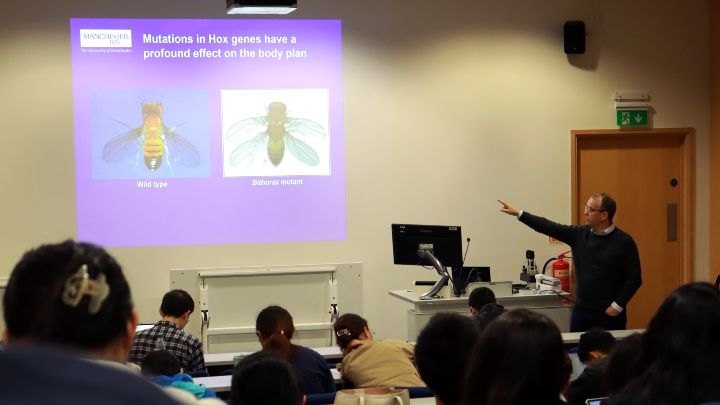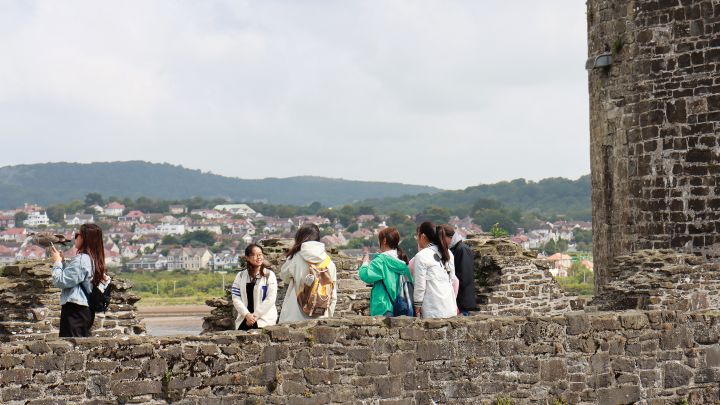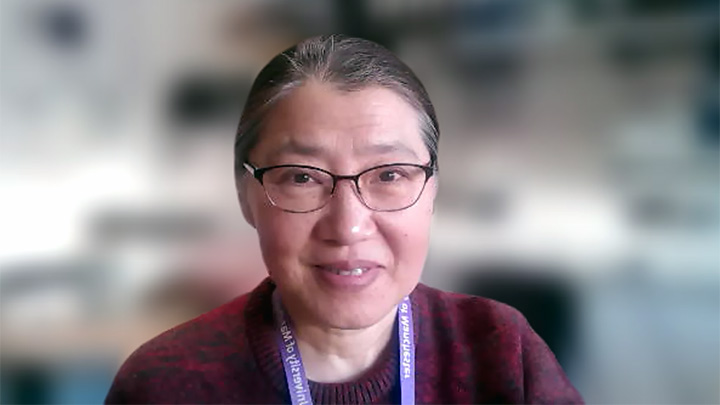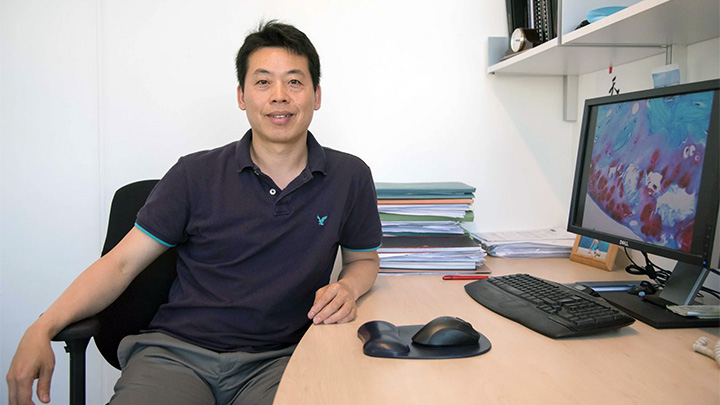Develop your research skills within biological and biomedical sciences
During this three-week summer school, you will attend seminars from world leading experts and perform experiments in our state-of-the-art laboratories.
You will also have the opportunity to improve your English writing skills and practise your presentation skills in an academic setting with your peers and Manchester academics.
This school will equip you with knowledge of cutting-edge science frontiers and technological advances in basic and biomedical sciences, as well as in modern medicine.
This experience will provide a firm foundation for those interested in pursuing a master's or PhD degree in life sciences or biomedical sciences in an international university.
Feedback from past students has unanimously recognised the high quality of the academic and social contents of the school. When asked which activity they enjoyed most, one student commented:
"The lab work, trips, everything! I wish I could come here for a master's course next year. It's wonderful."
On this page:
Talking science
Our programme includes innovative practical sessions teaching you why and how to communicate about science and health with broader audiences. These sessions will be led by experienced faculty from the MSc Science and Health Communication programme.

Social activities
Social activities will include a welcome reception and a farewell celebration (involving Manchester academics and students), as well as trips to local attractions.

What's included in the fee?
Fees include tuition fees, accommodation and scheduled social events.

Programme details
About your schedule
The summer school is structured to provide you with a focused schedule based around one of the many areas of bioscience research at The University of Manchester.
You will have the opportunity to learn and expand your knowledge in biological and biomedical sciences, and to have first-hand experience of British culture.
A typical week will include lectures, practical laboratory activities, experimental design, and data analysis in small groups or pairs.
Areas of study
During each week of the summer school, you'll be assigned to one of the selected areas of biosciences research skill modules (RSM). In the past, our students have been able to study a range of areas, including:
This RSM aims to introduce you to important research skills and techniques used in protein purification and characterisation.
You will perform enzyme kinetic studies and learn how to analyse your results using the Michaelis-Menten equation to determine the key enzyme kinetic parameters (Km, Vmax, and kcat). Yeast alcohol dehydrogenase (ADH) is used as a model.
You will also purify His-tagged recombinant yeast ADH proteins expressed in E. coli., using an affinity chromatograph, determine the protein concentration and enzyme-specific activities of the proteins you purified. The protein will also be further analysed during the Biochemical Analysis RSM.
Through this RSM, you should be able to expand your knowledge of protein purification and characterisation, and enhance your experimental and mini-project design skills.
Analysis of the purity and homogeneity of purified proteins is an essential skill in protein biochemistry. In this RSM, you will assess the purity and quantity of alcohol dehydrogenase (ADH) that you purified during Biochemistry RSM.
Following the purification of recombinant His-tagged yeast ADH from E. coli, you will analyse this protein with a blue-stained SDS-PAGE gel. You will also perform western blotting of ADH to understand the differences in these techniques in assessing both specificity and purity.
In addition, you will observe the determination of size and homogeneity of ADH using mass photometry and multiangle light scattering, at the Biomolecular Analysis core facility.
Through this RSM, you are expected to be able to apply your understanding of protein purification to the results obtained and further enhance your experimental skills.
This module aims to introduce you to the laboratory techniques used in cancer signalling study.
You will perform drug treatments of two cancer cell lines, which are came from the same patient before and after relapse. After the drug treatments, you will extract the cellular proteins by performing cell lysis on those cells, and carry out SDS-PAGE gel, western blotting, and protein phosphorylation analyses for cancer signalling proteins (e.g. pERK, ERK and VINC).
You will also quantify the results and interpret which cells are sensitive to the drug treatment.
This RSM aims to introduce you to the laboratory techniques used in cell biology to study proteins and disease-associated mutants.
You will perform bioinformatic analysis to predict the possible effects of disease-linked mutations. You will also work in the lab to analyse protein samples from cell lines expressing the wild type and disease-linked mutation proteins. These tests will assess expression level and glycosylation status using SDS-PAGE and western blotting.
You will then interpret their findings in combination with immuno-fluorescence microscopy data.
Fluorescence microscopy is a valuable tool to study the localisation of proteins. This RSM aims to introduce you to the laboratory techniques used in cell imaging to study protein localisation.
You will use green fluorescent protein (GFP) and antibody labelling to determine the localisation of an unknown GFP-chimera. You will be expected to formulate a hypothesis surrounding the localisation of your GFP-chimera protein, and then design an experiment to test the hypothesis using antibody labelling of cells expressing the GFP-chimera.
This RSM aims to introduce you to how immunohistochemistry can be used to determine the biological behaviour of a tumour.
You will conduct a series of investigations into the cell biology of neoplasia to understand the histogenesis and biology of soft tissue sarcomas.You will calculate the proliferation index of tumours and interpret the results. You will also identify key histological features required to make the diagnosis of a sarcoma and perform H & E staining of tumour tissue to observe the main histological features of the tumour.
Through this RSM, you will learn about experimental design and analyse your results with data analysis techniques.
This RSM aims to introduce you to the methods and techniques used in human genetics.
One of the key challenges for the treatment of human disease is to determine if there is a genetic component to the disease and, if so, to determine which gene or genes cause the abnormal phenotype.
In this RSM, you will learn and explore how diseases that show locus heterogeneity are studied. You will:
- investigate the methods used for the analysis of genetic markers associated with disease genes
- utilise pedigrees to track the inheritance of disease alleles
- analyse patient sequences to find mutations that are likely to cause the disease, and evaluate the biochemical effect of any mutations identified.
This RSM aims to introduce you to iPSC and CRISPR technologies.
Induced pluripotent stem cells (iPSCs) and CRISPR/Cas9 gene editing represent two significant breakthrough technologies in modern biomedicine, which enables disease modelling, cell therapy, drug discovery, and regenerative medicine.
You will be introduced to the basic concepts of iPSC and CRISPR/Cas9 technologies, learn how to make human iPSCs, and manipulate genes in iPSCs using CRISPR/Cas9.
You will learn the design of guide RNA and the delivery of CRISPR/Cas9 components into iPSCs, and then investigate how to analyse the gene editing results and determine its efficiency.
This RSM aims to introduce you to how neurons in the brain communicate, and you will investigate the ionic mechanisms behind neuronal action potentials.
You will conduct simulations of electrophysiology experiments using the MetaNeuron software. You will learn about action potentials, membrane conductance, current-clamp, and voltage-clamp electrophysiology experiments.
Furthermore, students will explore the impact of neuronal excitability alterations in neurological disorders such as epilepsy, using freely available human electrophysiology data from the Allen Brain Institute.
Staff
Dr Hui Lu
Academic Lead for the Biosciences International Summer School (Bio-SISS)
Dr Lu is a lecturer of Biochemistry in the School of Biological Sciences. Her research focus is redox regulation, function and quality control of mitochondrial proteins in health and diseases.

Professor Qing-Jun Meng
Founder of Bio-SISS, Director of Internationalisation, School of Biological Sciences
Qing-Jun is a Professor of Chronobiology and a Versus Arthritis Senior Research Fellow within the Faculty of Biology, Medicine and Health at The University of Manchester.

Contact us
Find out more
For information about booking your place on the Biosciences International Summer School, please get in touch.
Email: siss@manchester.ac.uk
